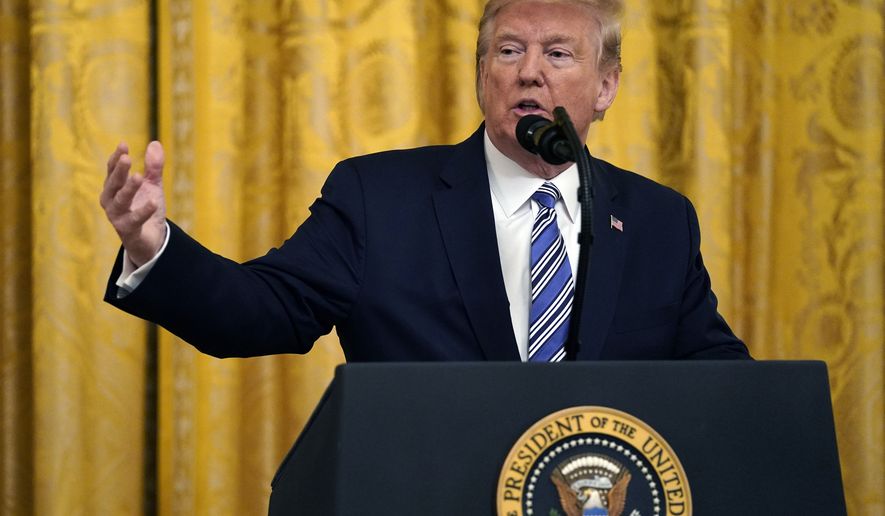President Trump highlighted small-business success stories of the administration’s Paycheck Protection Program on Tuesday, countering a series of embarrassing taxpayer-funded loans for the Los Angeles Lakers and major companies such as Ruth’s Chris Steak House, while clogs developed in the lending pipeline for a new batch of emergency aid.
In an event at the East Room of the White House, the president said the grants for nearly 2 million small businesses to date are providing a lifeline to better times ahead.
“Our experts believe the worst days of the pandemic are behind us,” Mr. Trump told invited small business leaders. “You’re going to be in good shape when we open our country. We’re coming back, and we’re coming back strong.”
Looking ahead to the next potential economic rescue package, the president also said he would ask for concessions from Democrats on sanctuary city laws in exchange for state aid.
“We want certain things including sanctuary city adjustments, because we have so many people in sanctuary cities, which I don’t even think are popular, even by radical left folks,” the president said. “People are being protected that shouldn’t be protected, and a lot of bad things are happening with sanctuary cities.”
The president said demand is “extraordinarily high” for the new round of PPP grants, which the Small Business Administration began lending on Monday. The president said the government has processed 450,000 loan applications totaling $50 billion in this new phase.
“We’re processing loans at a pace never achieved before,” Mr. Trump said.
He called to the stage business owners like Tony Stafford, who owns three Ford’s Fish Shack restaurants in northern Virginia. Mr. Stafford said the shutdown “devastated” his company, forcing him to furlough more than 100 employees.
But the PPP grant enabled the company to keep paying its workers.
“It’s been awesome to be able to tell them that we’re going to weather this storm,” Mr. Stafford said.
Chris Stansbury of West Virginia Eye Consultants said the shutdown affected the firm’s 60 employees, but the PPP grant rescued them.
“It’s been a lifeline for us,” he said. “We were able to start paying our utilities, our rent, and to start bringing some of those employees back.”
White House officials say the first round of small business aid, $350 billion, has helped about 30 million workers keep their jobs at a time when 26 million other Americans were laid off from the coronavirus shutdown.
The demand was so great that Small Business Administration approved more than 1.6 million forgivable loans in less than two weeks. Companies with fewer than 500 employees can obtain up to $10 million to help keep employees on the payroll for two months.
But the program also has come under fire for giving money to employers who either didn’t qualify or didn’t need the money, such as a $4.6 million loan to the NBA’s Lakers, whose team payroll for superstar LeBron James and others totals $125 million.
There also have been at least 200 publicly traded companies that received about $800 million in the first round of aid, while hundreds of thousands of small businesses got shut out.
The Lakers, and some companies such as Shake Shack, have given back their loans to the government after a public outcry. Treasury Secretary Steven T. Mnuchin said the loans involved a small number of companies.
“They were either owned by public companies, or the Los Angeles Lakers — I’m a big Lakers fan, I’m outraged that they took that loan,” Mr. Mnuchin said on Fox Business Network. “I’m glad to see they paid it back.”
The negative publicity forced the administration to announce that the Small Business Administration will review, retroactively, any loans of more than $2 million. Mr. Mnuchin said companies that shouldn’t have taken the money will be required to repay it, and could be subject to criminal penalties.
“I encourage everybody to look at this and pay back these loans now so we can recycle the money if you made a mistake,” he said.
A banking industry source said Tuesday that lenders were being frustrated by the SBA’s new “pacing” of applications to limit the rush, and that the agency’s electronic processing system was still crashing or locking out lenders.
“The so-called ’pacing’ mechanism SBA has put into place has been a disaster,” the source said. “Most banks get locked out after 10 minutes – results seem to be across the board, regardless of size or entry method.”
• Dave Boyer can be reached at dboyer@washingtontimes.com.




Please read our comment policy before commenting.